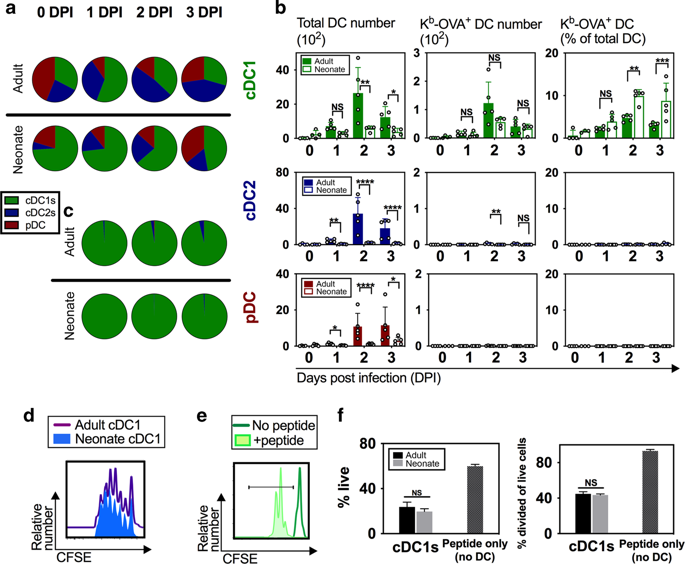当前位置:
X-MOL 学术
›
Mucosal Immunol.
›
论文详情
Our official English website, www.x-mol.net, welcomes your feedback! (Note: you will need to create a separate account there.)
Type I IFN ineffectively activates neonatal dendritic cells limiting respiratory antiviral T-cell responses.
Mucosal Immunology ( IF 8 ) Pub Date : 2019-12-04 , DOI: 10.1038/s41385-019-0234-5 Annie W Lau-Kilby 1 , Mathilde Turfkruyer 1 , Margaret Kehl 1 , Lijuan Yang 2 , Ursula J Buchholz 2 , Kimberly Hickey 3 , Allison M W Malloy 1
Mucosal Immunology ( IF 8 ) Pub Date : 2019-12-04 , DOI: 10.1038/s41385-019-0234-5 Annie W Lau-Kilby 1 , Mathilde Turfkruyer 1 , Margaret Kehl 1 , Lijuan Yang 2 , Ursula J Buchholz 2 , Kimberly Hickey 3 , Allison M W Malloy 1
Affiliation

|
Insufficient T-cell responses contribute to the increased burden of viral respiratory disease in infancy. Neonatal dendritic cells (DCs) often provide defective activation of pathogen-specific T cells through mechanisms that are incompletely understood, which hinders vaccine design for this vulnerable age group. Enhancing our characterization of neonatal DC sub-specialization and function is therefore critical to developing their potential for immunomodulation of T-cell responses. In this study, we engineered respiratory syncytial virus (RSV) to express a model protein, ovalbumin, to track antigen-presenting DCs in vivo. We found that murine neonatal conventional DC1s (cDC1s) efficiently migrated and presented RSV-derived antigen, challenging the paradigm that neonatal DCs are globally immature. In a key observation, however, we discovered that during infection neonatal cDC1s presenting viral antigen were unable to upregulate costimulatory molecules in response to type I interferons (IFN-I), contributing to poor antiviral T-cell responses. Importantly, we showed that the deficient response to IFN-I was also exhibited by human neonatal cDC1s, independent of infection. These findings reveal a functionally distinct response to IFN-I by neonatal cDC1s that may leave young infants susceptible to viral infections, and provide a new target for exploration, in light of failed efforts to design neonatal RSV vaccines.
中文翻译:

I 型干扰素无法有效激活新生儿树突状细胞,从而限制呼吸道抗病毒 T 细胞反应。
T 细胞反应不足导致婴儿期病毒性呼吸道疾病的负担增加。新生儿树突状细胞 (DC) 通常通过不完全了解的机制提供病原体特异性 T 细胞的缺陷激活,这阻碍了针对这一脆弱年龄组的疫苗设计。因此,加强我们对新生儿 DC 亚专业化和功能的表征对于开发它们对 T 细胞反应进行免疫调节的潜力至关重要。在这项研究中,我们设计了呼吸道合胞病毒 (RSV) 来表达模型蛋白卵清蛋白,以追踪体内的抗原呈递 DC。我们发现小鼠新生儿常规 DC1 (cDC1) 有效迁移并呈递 RSV 衍生抗原,挑战了新生儿 DC 在全球范围内不成熟的范例。然而,在一项关键观察中,我们发现在感染期间,呈递病毒抗原的新生儿 cDC1 无法上调共刺激分子以响应 I 型干扰素 (IFN-I),从而导致抗病毒 T 细胞反应较差。重要的是,我们发现人类新生儿 cDC1 也表现出对 IFN-I 的反应不足,与感染无关。这些发现揭示了新生儿 cDC1 对 IFN-I 的功能不同的反应,这可能使年幼的婴儿易受病毒感染,并提供了一个新的探索目标,因为设计新生儿 RSV 疫苗的努力失败了。我们发现人类新生儿 cDC1 也表现出对 IFN-I 的反应不足,与感染无关。这些发现揭示了新生儿 cDC1 对 IFN-I 的功能不同的反应,这可能使年幼的婴儿易受病毒感染,并提供了一个新的探索目标,因为设计新生儿 RSV 疫苗的努力失败了。我们发现人类新生儿 cDC1 也表现出对 IFN-I 的反应不足,与感染无关。这些发现揭示了新生儿 cDC1 对 IFN-I 的功能不同的反应,这可能使年幼的婴儿易受病毒感染,并提供了一个新的探索目标,因为设计新生儿 RSV 疫苗的努力失败了。
更新日期:2019-12-04
中文翻译:

I 型干扰素无法有效激活新生儿树突状细胞,从而限制呼吸道抗病毒 T 细胞反应。
T 细胞反应不足导致婴儿期病毒性呼吸道疾病的负担增加。新生儿树突状细胞 (DC) 通常通过不完全了解的机制提供病原体特异性 T 细胞的缺陷激活,这阻碍了针对这一脆弱年龄组的疫苗设计。因此,加强我们对新生儿 DC 亚专业化和功能的表征对于开发它们对 T 细胞反应进行免疫调节的潜力至关重要。在这项研究中,我们设计了呼吸道合胞病毒 (RSV) 来表达模型蛋白卵清蛋白,以追踪体内的抗原呈递 DC。我们发现小鼠新生儿常规 DC1 (cDC1) 有效迁移并呈递 RSV 衍生抗原,挑战了新生儿 DC 在全球范围内不成熟的范例。然而,在一项关键观察中,我们发现在感染期间,呈递病毒抗原的新生儿 cDC1 无法上调共刺激分子以响应 I 型干扰素 (IFN-I),从而导致抗病毒 T 细胞反应较差。重要的是,我们发现人类新生儿 cDC1 也表现出对 IFN-I 的反应不足,与感染无关。这些发现揭示了新生儿 cDC1 对 IFN-I 的功能不同的反应,这可能使年幼的婴儿易受病毒感染,并提供了一个新的探索目标,因为设计新生儿 RSV 疫苗的努力失败了。我们发现人类新生儿 cDC1 也表现出对 IFN-I 的反应不足,与感染无关。这些发现揭示了新生儿 cDC1 对 IFN-I 的功能不同的反应,这可能使年幼的婴儿易受病毒感染,并提供了一个新的探索目标,因为设计新生儿 RSV 疫苗的努力失败了。我们发现人类新生儿 cDC1 也表现出对 IFN-I 的反应不足,与感染无关。这些发现揭示了新生儿 cDC1 对 IFN-I 的功能不同的反应,这可能使年幼的婴儿易受病毒感染,并提供了一个新的探索目标,因为设计新生儿 RSV 疫苗的努力失败了。


























 京公网安备 11010802027423号
京公网安备 11010802027423号